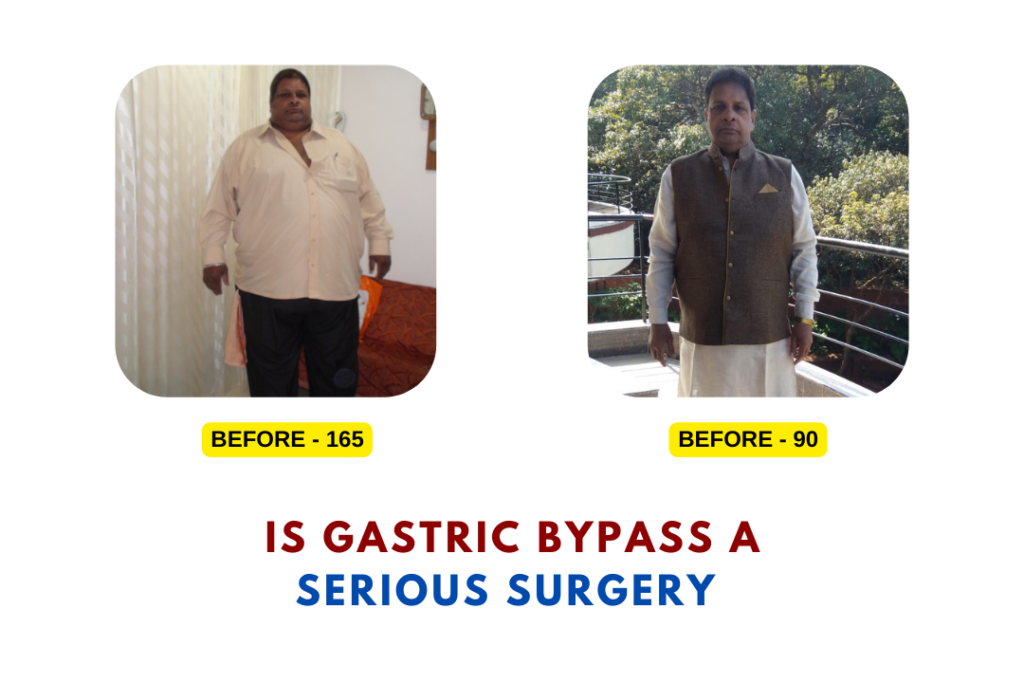
Amin Nikita
Bariatric Dietician & Content Writer

Is Gastric Bypass Surgery a Serious Surgery?

Gastric Bypass -
Gastric bypass surgery, also known as Roux-en-Y gastric bypass, is a weight loss surgery that involves creating a smaller stomach pouch and rerouting a portion of the small intestine. This procedure is designed to help individuals with obesity lose weight and improve obesity-related health conditions.
During gastric bypass surgery, the surgeon divides the stomach into a small upper pouch and a larger lower pouch. The small intestine is then divided, and the lower part of the small intestine is connected to the small upper stomach pouch, bypassing the rest of the stomach and the upper portion of the small intestine. This rerouting of the digestive system restricts the amount of food
that can be eaten and reduces the absorption of nutrients, leading to weight loss.
1. Soluble fiber:
Soluble fiber dissolves in water and forms a gel-like substance in the digestive tract. It slows digestion, promotes satiety, and may help regulate blood sugar levels. Good sources of soluble fiber are oats, barley, legumes (beans, lentils, peas), fruits (apples, oranges, berries) and vegetables (carrots, broccoli, Brussels sprouts).
Psyllium husk:
Psyllium is a soluble dietary fiber commonly used as a dietary supplement or additive to food due to its high fiber content. It improves bowel movements and helps relieve constipation. Psyllium husk comes in powder or capsule form, but it’s important to follow the recommended dosage instructions.
2. Insoluble Fiber:
Insoluble fiber adds bulk to the stool, aiding in regular bowel movements and preventing constipation. It doesn’t dissolve in water but absorbs water in the digestive system, which helps soften the stool. Whole grains (brown rice, quinoa, whole wheat), nuts and seeds (almonds, chia seeds, flaxseeds), and vegetables (cabbage, kale, cauliflower) are good sources of insoluble fiber.
Gastric Bypass Surgery a Serious Surgery -
Yes, gastric bypass surgery is indeed an important and serious surgical procedure, it has tremendously positive outcomes when suggested to patients with BMI higher than 30 or 35 + with two or more comorbidities. Digestive system modifications are required and there are risks associated with any surgical procedure. It is important for anyone considering gastric bypass surgery to have a clear understanding of the surgery, its potential benefits, and the associated risks.
Potential risks and complications associated with gastric bypass surgery include:
Operational risk: As with any surgery, there are risks associated with anaesthesia, bleeding, infections, and drug side effects.
Malnutrition: After gastric bypass surgery, changes in the digestive system can reduce absorption of certain nutrients, such as iron, calcium, vitamin B12, and folic acid. Preventing deficiencies usually requires lifelong supplementation and close monitoring of nutrient levels.
Dumping Syndrome: As previously mentioned, dumping syndrome is a common complication after gastric bypass surgery. Symptoms include nausea, diarrhoea, and dizziness, which are usually caused by the rapid passage of food into the small intestine.
Complications of Gastric Bypass: Specific complications of gastric bypass surgery include narrowing or obstruction of new connections, ulcers, hernias, gallstones, and gastrointestinal leaks.
Changes in bowel habits: Some people experience changes in bowel habits such as diarrhoea or constipation after gastric bypass surgery.
Gastric bypass surgery has several potential benefits:
- Significant weight loss: Gastric bypass surgery can result in substantial weight loss, with most individuals losing a significant amount of excess weight in the first year of following the procedure.
- Resolution of obesity: related health conditions: Weight loss achieved through gastric bypass surgery can lead to improvement or resolution of obesity-related health conditions, such as type 2 diabetes, high blood pressure, sleep apnea, and joint pain.
- Improved quality of life: Losing weight and experiencing improvements in health can enhance overall quality of life, including increased mobility, improved self-esteem, and greater energy levels.
- Metabolic changes: Gastric bypass surgery can result in metabolic changes, including improved insulin sensitivity and changes in gut hormones, which can
positively affect hunger, appetite, and metabolism.
Safety considerations for gastric bypass surgery include:
Surgical expertise: The safety and success of gastric bypass surgery are closely linked to the experience and skill of the surgeon performing the procedure. It is essential to choose a qualified and experienced bariatric surgeon who specialises in weight loss surgery.
Preoperative evaluation: A thorough evaluation is conducted before surgery to assess an individual’s overall health and determine if they are a suitable candidate for gastric bypass surgery. This evaluation typically includes physical examinations, medical history review, laboratory tests, and sometimes additional screenings, such as imaging studies or cardiac evaluations.
Surgical risks: As with any surgery, gastric bypass surgery carries inherent risks, such as complications related to anaesthesia, bleeding, infection, blood clots, and adverse reactions to medications. However, the risk of serious complications is generally low when the surgery is performed in accredited healthcare facilities.
Post-operative care: The safety and success of gastric bypass surgery also depend on the quality of post-operative care. Close monitoring, proper wound care, pain management, and adherence to post-operative instructions are crucial for minimising the risk of complications and ensuring a smooth recovery.
Long-term follow-up: Gastric bypass surgery requires long-term commitment and follow-up care. Regular follow-up visits with the surgical team are important to monitor progress, address any concerns, and provide ongoing support for lifestyle changes and potential complications.
It is important that anyone considering gastric bypass surgery undergoes a thorough evaluation and screening process that includes interviews with medical professionals such as bariatric surgeons and a multidisciplinary team specialising in weight loss surgery. These professionals provide comprehensive assessments of potential benefits and risks to help individuals make informed decisions about treatment options.
AASTHA BARIATRICS provides excellent treatment for patients and guides them through the bariatric surgery procedure. This wellness centre is dedicated to promoting the health of the community by providing high-quality personalised healthcare with compassion, courtesy, and respect for patients.






